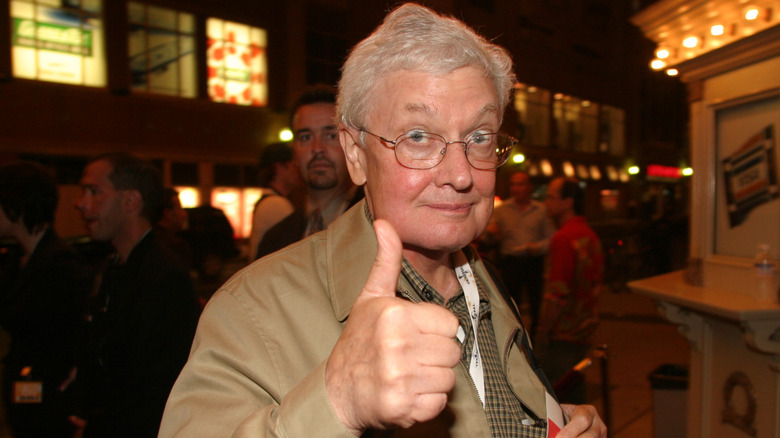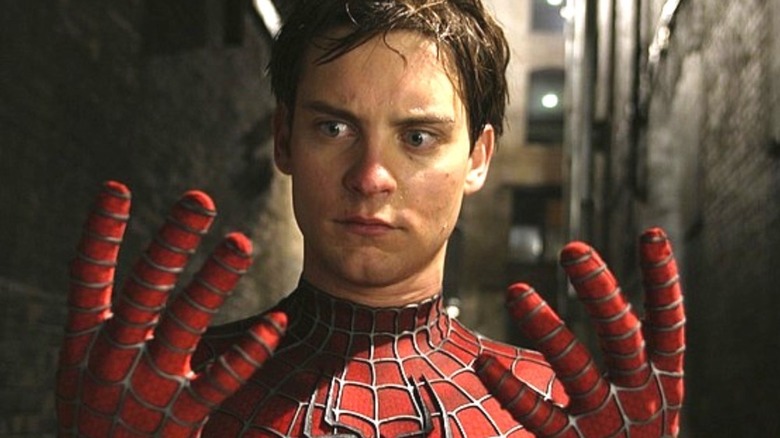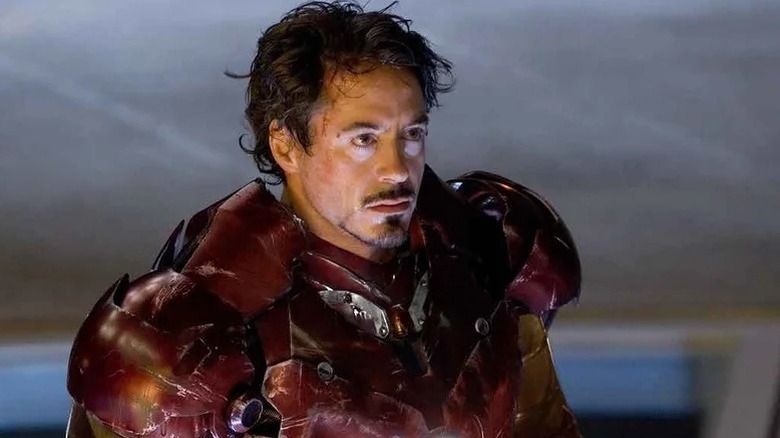Roger Ebert Only Gave A Perfect Score To Two Marvel Movies
Roger Ebert was a titan of modern film criticism, always rendering his opinion in plain-spoken but precise language — and gathering plenty of fans of his own along the way. But in his long career, he only gave two Marvel films (and a handful of sci-fi films) a perfect 4 out of 4 stars: "Spider-Man 2" from 2004 and "Iron Man" from 2008.
While Ebert wasn't a huge fan of the original "Spider-Man," giving it only 2 ½ stars and even less of a fan of the third movie in the Sam-Raimi directed trilogy, he adored the second movie. In his review, he called "Spider-Man 2," which stars Tobey Maguire as Peter Parker and Kirsten Dunst as Mary Jane Watson, "the best superhero movie since the modern genre was launched," and lauded Raimi for "never step[ping] wrong in a film that effortlessly combines special effects and a human story, keeping its parallel plots alive and moving."
Four years later, "Iron Man" came out, and Ebert was similarly complimentary. Although this was a very different movie from "Spider-Man 2," Ebert admired it due to Robert Downey Jr.'s bravura performance as Tony Stark, calling it "intriguing and unexpected." He explained that while Downey "lacks the psychic weight and gravitas" of most superheroes, director Jon Favreau boldly decided to give Downey the job and let him "think and talk the way he does." In the end, Ebert concludes, "[Robert Downey Jr. as Tony Stark] is strong because he is smart, quick, and funny, and because we sense his public persona masks deep private wounds. By building on that, Favreau found his movie, and it's a good one." Let's look closer at these two films.
Spider-Man 2 was the apex of an early era of superhero films
"Spider-Man 2" is the fruition of what a superhero movie could be before Marvel and DC decided to make cinematic universes. While Roger Ebert was far from a snob about superhero films, liking everything from "X2: X-Men United" to "Daredevil," and giving "Superman," the film that kicked off the modern superhero era in 1978, 4 stars, he was tough on the genre. He wasn't a fan of many superhero films' focus on superpowers over the humans who bear them. But with "Spider-Man 2," the genre reaches its apex by not overloading us with Spider-Man and instead choosing to explore Peter Parker's heart and mind.
In "Spider-Man 2," Peter Parker (Tobey Maguire) can't use his Spidey powers. It seems his responsibilities as a superhero and his desire for a normal life are in conflict, and he ends up giving up on Spider-Man. At the same time, Doctor Octavius (Alfred Molina) mentors Peter, only for Doc Ock to have an accident with a tentacled harness that begins to take over his mind, leading to him becoming an antagonist to Spider-Man. This combination worked beautifully for Ebert. The movie was the culmination of an era of individual series about individual superheroes, and it delivered. According to Ebert, "Spider-Man 2" is "a real movie, full-blooded and smart, with qualities even for those who have no idea who Stan Lee is."
Iron Man launched the Marvel Cinematic Universe
While "Iron Man" was released only 4 years later, it took place in an entirely different era of superhero movies. "Iron Man" was the first movie released in the Marvel Cinematic Universe, a superhero extravaganza that is still going almost two decades later. While it's now hard to separate individual movies like "Iron Man" from crossover movies like "The Avengers," in 2008, "Iron Man" came across as a movie about an individual hero, and Roger Ebert was here for it.
"Iron Man" is about Tony Stark's (Robert Downey Jr.) evolution from a warmongering arms dealer to a guy who decides his company will stop manufacturing weapons, even as he makes his own suit of armor, complete with violent devices, at home. Ebert appreciated the movie, especially Robert Downey Jr.'s role in it, but Ebert also didn't see the evolution of the Marvel Cinematic Universe in its entirety. In fact, Ebert died before the third movie in the "Iron Man" trilogy came out.
Although he saw the start of Marvel's great cinematic takeover, up through the release of "The Avengers" in 2012, which he gave three stars, he didn't see the MCU reach its apex with "Avengers: Endgame" and its bumpy ride since. It would be fascinating to know what Ebert thought of these developments, especially since, although "Iron Man" was clearly a high water mark, most of what came afterward was not quite as good to downright abysmal. Still, we can safely take his advice about "Iron Man," even if we ignore everything that came afterwards in the MCU.


